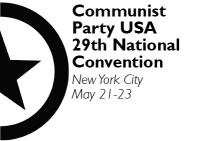 This article is part of the discussion leading up to the Communist Party USA’s 29th National Convention May 21-23, 2010. CPUSA.org takes no responsibility for the opinions expressed in this article or other articles in the pre-convention discussion. All contributions must meet the guidelines for discussion. To read other contributions to this discussion, visit the site of the Pre-Convention Discussion period.
This article is part of the discussion leading up to the Communist Party USA’s 29th National Convention May 21-23, 2010. CPUSA.org takes no responsibility for the opinions expressed in this article or other articles in the pre-convention discussion. All contributions must meet the guidelines for discussion. To read other contributions to this discussion, visit the site of the Pre-Convention Discussion period.
All contributions to the discussion should be sent to discussion2010@cpusa.org for selection not to the individual venues.For more information on the convention or the pre-convention discussion period, you can email convention2010@cpusa.org.
Here is just a quick comment on the issue of criticisms of Obama from the left.
The ultra-left went into the 2008 election cycle with the a priori, un historical and un dialectical idea that there is “not a dimes worth of difference” between the two major bourgeois parties. They drew from this the conclusion that the only use that should be made of electoral politics is as a platform to denounce the whole capitalist system. If there is not “a dime’s worth of difference” it really does not matter if a vote for a protest candidate lets in the Republican, because the Democrat is just as bad.
This is wrong because even though both the Democratic and Republican parties support capitalism, they support different policies within capitalism. The Democratic position is usually better for the working class and for the left, because the Democrats are more likely to make concessions to labor and other mass constituencies, and because the Republicans are more likely to use repression against labor and the left. This is a matter of degree, of course, but it is important. So the CPUSA has pushed the vote for Democratic candidates, not because we have the illusion that they will bring us socialism, nor because we have actually given up on socialism, but because socialism is not an immediately achievable goal and voting for the Democrats is likely to produce a better situation from which to push the struggle forward, eventually putting socialism on the agenda.
So to those on the left who say “we told you so” about Obama and the expanded Democratic majority, we can reply “and so you think that McCain and the Republicans would have been better?”.
But criticism of Obama for specific policy decisions, especially from people who are not floating around in the Cloud Cuckoo-Land of the ultra left, but rather are intensely engaged in the mass struggle, is another matter. In many cases when Obama makes rightward-tending decisions, whether they are concessions to pressure or reflect his own basic views, they are almost never attributable to the pressure of mass public opinion. The American people as a whole are not in favor of more U.S. involvement in wars in Afghanistan and elsewhere. They do not support the U.S. blockade of Cuba. They want financial help for working people, not crooked financiers. The public opinion polls bear this out. An exception might be the health care debate in which Obama, instead of coming up with a clear program and using his awesome communications skills to explain it to the American people, conceded the leadership to Congress, which is sort of like dumping the thing into a cage full of rabid squirrels. The result is a frustrating mess which has a lot of people confused who would otherwise support progressive reform. This has made it possible for the Republican right to step in with their vicious nonsense about “death panels” and the rest.
When Obama makes concessions to reactionary vested interests, he undermines “democratic coalition” of which others have written. He opens the door to a return to power of the G.O.P. For such things, it is absolutely essential that we forcefully criticise the Obama administration’s policies.
In the wake of the 2008 elections, some comrades were talking about Obama in an excessively adulatory tone. I hope we have got past this and now can return to basing our judgments, statements and positions on a scientific analysis of the state of the class struggle, defending or criticizing the administration as the situation requires.


 Join Now
Join Now